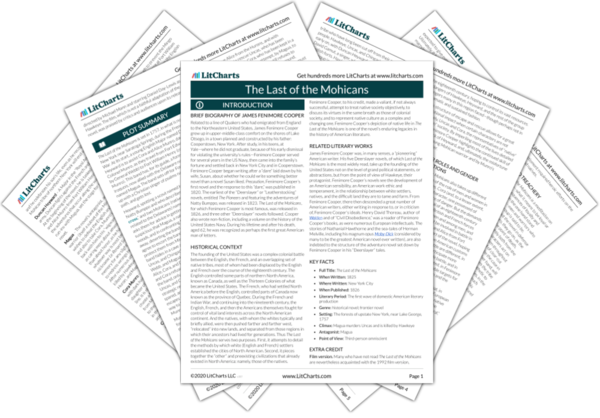The structure of the novel’s action is that of escape, pursuit, and rescue, in which Hawkeye, Uncas, and Chingachgook, and sometimes Heyward, engage in a back and forth with Magua, alternately rescuing and losing Cora and Alice. These complex sequences of escape, pursuit, and rescue serve several purposes in the novel. First, they are necessary components of the “frontier adventure novel,” of which Last of the Mohicans is perhaps the primary example. In this form of the adventure yarn, tension is maintained primarily by the peril of its main characters, and by the defeat of a mortal enemy—in this case, Magua.
Second, they underscore the difficulties of life in the American colonies at this point in their history. Many societies, native and European, converged on a relatively small space in the middle of the eighteenth century, hoping to control its vast resources. The dangers of Hawkeye, Heyward, and the rest of the group are dangers many in this region faced—though perhaps not in such dramatic and sustained fashion.
Third, this structure of escape and rescue allows for a great deal of emotional impact when certain characters are not saved—namely, Uncas and Cora, the representatives of “native” and “European” society. By imperiling most of the lives detailed in the novel, Fenimore Cooper highlights the continued skill of Hawkeye, the luck of Heyward, and, ultimately, the misfortune suffered by the young Mohican warrior and by Munro’s courageous daughter.
Escape, Pursuit, and Rescue ThemeTracker

Escape, Pursuit, and Rescue Quotes in The Last of the Mohicans
It was a feature peculiar to the colonial wars of North America, that the toils and dangers of the wilderness were to be encountered before the adverse hosts could meet.
These Indians know the nature of the woods, as it might be by instinct!
A Huron! They are a thievish race, nor do I care by whom they are adopted; you can never make anything of them but skulks and vagabonds.
What is to be done? . . . Desert me not, for God’s sake! Remain to defend those I escort, and freely name your own reward!
Are we quite safe in this cavern? Is there no danger of surprise? A single armed man at its entrance, would hold us at his mercy.
He [Uncas] saved my life in the coolest and readiest manner, and he has made a friend who never will require to be reminded of the debt he owes.
Well done for the Delawares! Victory to the Mohican! A finishing blow from a man without a cross will never tell against his honor, nor rob him of his right to the scalp.
Hold! ‘Tis she! God has restored me to my children! Throw open the sally-port; to the field; . . . pull not a trigger, lest ye kill my lambs!
We must get down to it, Sagamore, beginning at the spring, and going over the ground by inches. The Huron shall never brag in his tribe that he has a foot which leaves no print.
When an Indian chief comes among his white fathers, he lays aside his buffalo robe, to carry the shirt that is offered him. My brothers have given me paint, and I wear it.
Even so, I will abide in the place of the Delaware. Bravely and generously has he battled in my behalf; and this, and more, will I dare in his service.
Several of the [Huron] chiefs had proposed deep and treacherous schemes to surprise the Delawares, and, by gaining possession of their camp, to recover their prisoners by the same blow; for all agreed that their honor, their interests, and the peace and happiness of their dead countrymen, imperiously required them speedily to immolate some victims to their revenge.
The pale-faces are dogs! The Delawares women! Magua leaves them on the rocks, for the crows!
Go, children of the Lenape, the anger of the Manitou is not done. Why should Tamenund stay? The pale-faces are masters of the earth, and the time of the redmen has not yet come again. My day has been too long. In the morning I saw the sons of Unamis [the Mohicans] happy and strong; and yet, before the night has come, have I lived to see the last warrior of the wise race of the Mohicans.











